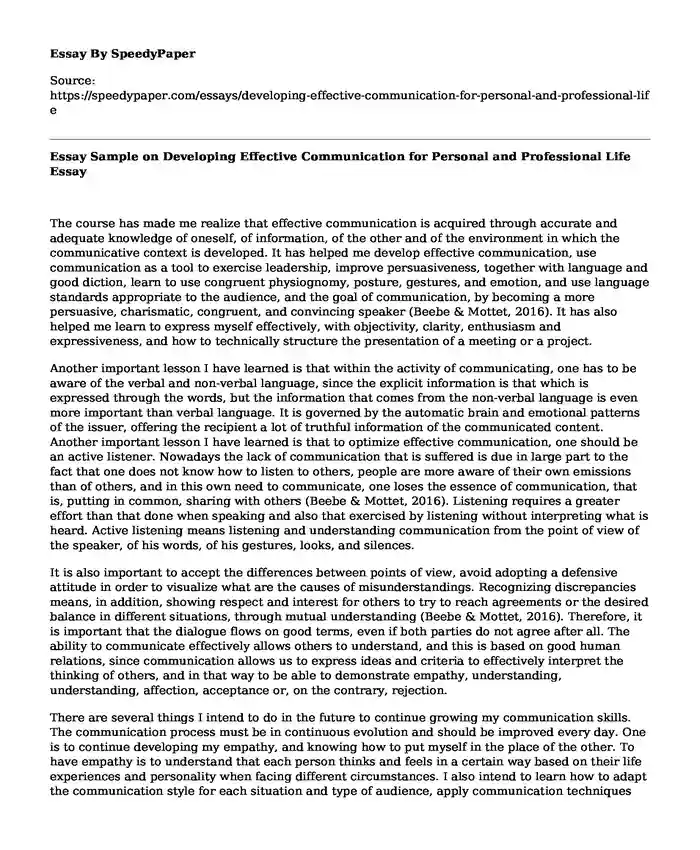
| Type of paper: | Essay |
| Categories: | Learning Communication skills |
| Pages: | 3 |
| Wordcount: | 662 words |
The course has made me realize that effective communication is acquired through accurate and adequate knowledge of oneself, of information, of the other and of the environment in which the communicative context is developed. It has helped me develop effective communication, use communication as a tool to exercise leadership, improve persuasiveness, together with language and good diction, learn to use congruent physiognomy, posture, gestures, and emotion, and use language standards appropriate to the audience, and the goal of communication, by becoming a more persuasive, charismatic, congruent, and convincing speaker (Beebe & Mottet, 2016). It has also helped me learn to express myself effectively, with objectivity, clarity, enthusiasm and expressiveness, and how to technically structure the presentation of a meeting or a project.
Another important lesson I have learned is that within the activity of communicating, one has to be aware of the verbal and non-verbal language, since the explicit information is that which is expressed through the words, but the information that comes from the non-verbal language is even more important than verbal language. It is governed by the automatic brain and emotional patterns of the issuer, offering the recipient a lot of truthful information of the communicated content. Another important lesson I have learned is that to optimize effective communication, one should be an active listener. Nowadays the lack of communication that is suffered is due in large part to the fact that one does not know how to listen to others, people are more aware of their own emissions than of others, and in this own need to communicate, one loses the essence of communication, that is, putting in common, sharing with others (Beebe & Mottet, 2016). Listening requires a greater effort than that done when speaking and also that exercised by listening without interpreting what is heard. Active listening means listening and understanding communication from the point of view of the speaker, of his words, of his gestures, looks, and silences.
It is also important to accept the differences between points of view, avoid adopting a defensive attitude in order to visualize what are the causes of misunderstandings. Recognizing discrepancies means, in addition, showing respect and interest for others to try to reach agreements or the desired balance in different situations, through mutual understanding (Beebe & Mottet, 2016). Therefore, it is important that the dialogue flows on good terms, even if both parties do not agree after all. The ability to communicate effectively allows others to understand, and this is based on good human relations, since communication allows us to express ideas and criteria to effectively interpret the thinking of others, and in that way to be able to demonstrate empathy, understanding, understanding, affection, acceptance or, on the contrary, rejection.
There are several things I intend to do in the future to continue growing my communication skills. The communication process must be in continuous evolution and should be improved every day. One is to continue developing my empathy, and knowing how to put myself in the place of the other. To have empathy is to understand that each person thinks and feels in a certain way based on their life experiences and personality when facing different circumstances. I also intend to learn how to adapt the communication style for each situation and type of audience, apply communication techniques that generate beneficial solutions, and managing confrontation and disagreements fairly and with confidence. Lastly, I intend to improve my non-verbal communication skills. one of the great challenges of the human being is the fear of standing up and expressing his ideas before others. Professionals are increasingly involved in formal or informal communication situations in their work. Based on this perspective, it can be said that posture, speech, speech, and voice are, par excellence, instruments of action of professionals; the essential means to make contact with others and to obtain results.
References
Beebe, S. A., & Mottet, T. P. (2016). Business and professional communication: Principles and skills for leadership (3rd ed.). Boston, MA: Pearson
Cite this page
Essay Sample on Developing Effective Communication for Personal and Professional Life. (2022, Aug 18). Retrieved from https://speedypaper.com/essays/developing-effective-communication-for-personal-and-professional-life
Request Removal
If you are the original author of this essay and no longer wish to have it published on the SpeedyPaper website, please click below to request its removal:
- Essay Example: Pharmacy School Personal Statement
- Free Essay on Strategic Planning Concepts in Management
- Free Essay Sample on Foodborne Illness
- Comparison Essay Sample: Healthcare System in the U.S. and Japan
- Improve Your Skills Owing to This Essay Example
- Essay Sample on Drug Addiction Treatment
- Paper Example - The Lives of Lovers of Wisdom
Popular categories




